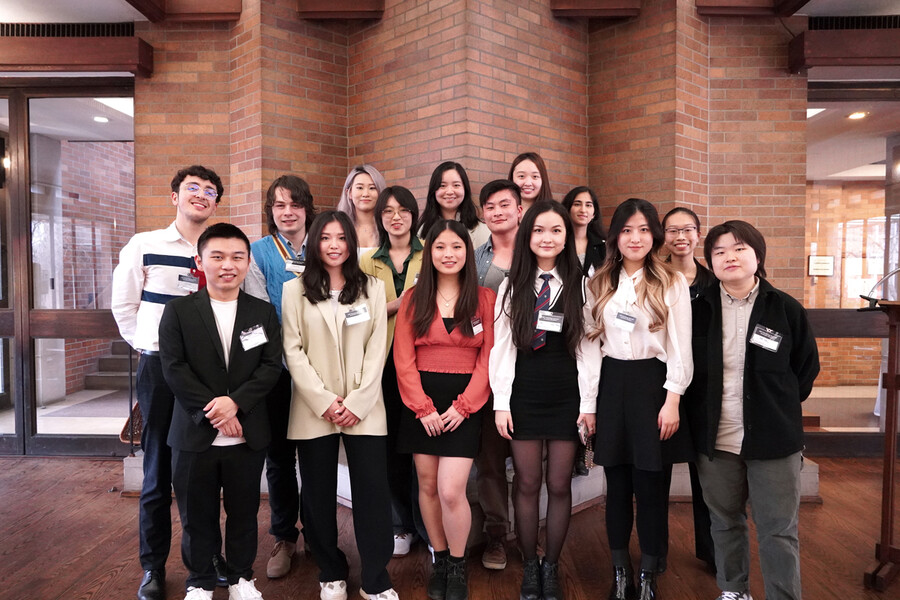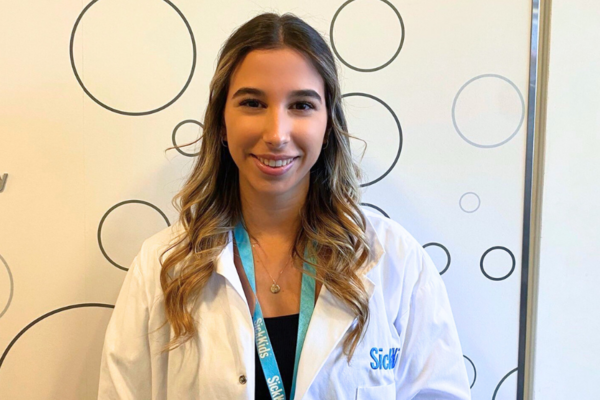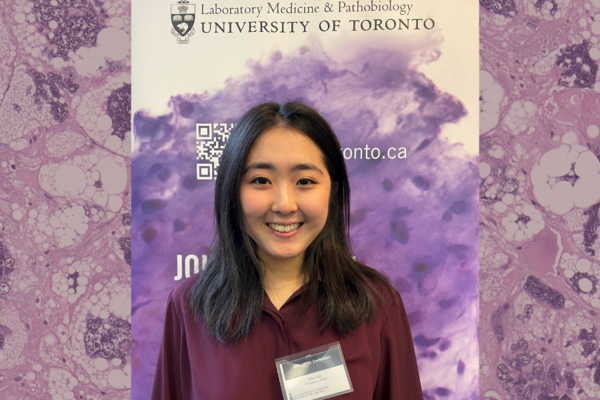Undergraduate students show excellence in leadership
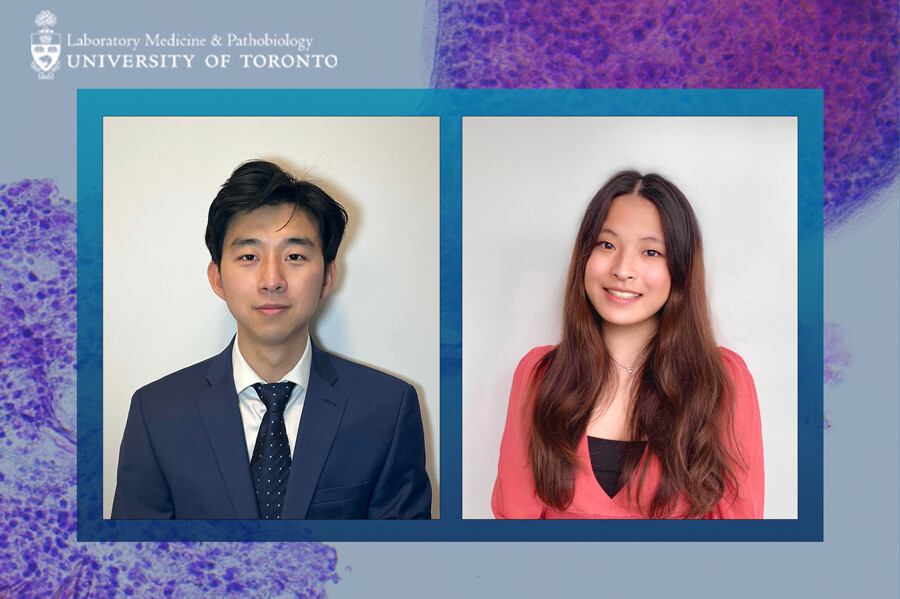
The Office of the Vice Dean, Research and Health Science Education (OVDRHSE) Undergraduate Student Leadership Award recognizes students for their excellence in leadership and scholarship as well as their contribution to academic and student life at the University of Toronto and beyond.
We are delighted to announce that two specialist Program in Pathobiology students in the Department of Laboratory Medicine and Pathobiology have received this award: Adam Bai and Britney Feng.
Dr. Jeff Lee, Undergraduate Coordinator, Pathobiology Specialist program and Associate Chair, Life Science Education, commented, “Whether it is through offering support to prospective students interested in the LMP program, taking time to listen and help second/third year LMP students with questions surrounding courses and general advice, or attending departmental events/celebrations, Britney has shown her dedication to help foster the supportive and tight-knit community that the LMP undergraduate program is proud of.
Adam is an outstanding student who has participated in all facets of the undergraduate experience, and time and again has earned the respect of both his peers and his professors for his strong leadership qualities.”
Find out more about them, why the joined the Specialist Program and why they have received this award!
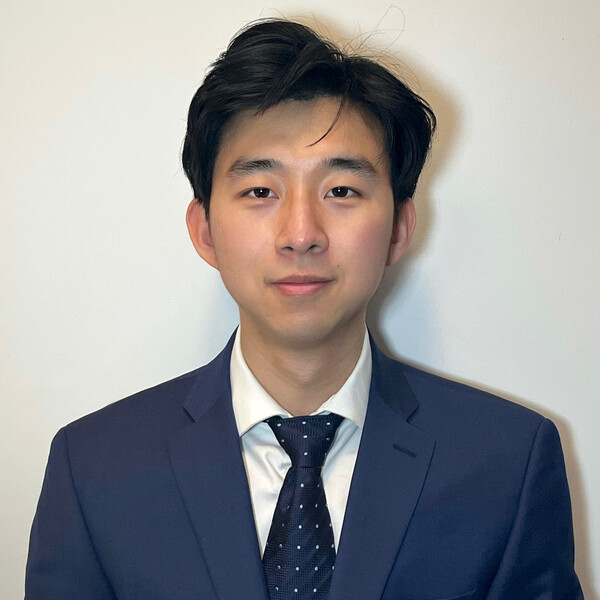
Adam Bai
“I chose the Laboratory Medicine and Pathobiology specialist program because I was fascinated with learning about the etiology and pathogenesis of the many diseases I have heard about throughout my life. Additionally, I have always been very passionate about research and this program provides a wide array of research opportunities. This program has been central to fostering my passion for research and my understanding of the translational significance between the sciences and medicine.
Throughout university, I have had the fortunate opportunity to hold many leadership positions in various clubs including the University of Toronto Pre-Medical Association, U of T Mental Health Association, U of T Cam’s Kids, and the U of T Biochemistry Undergraduate Student Society.
Research has always been central to my identity. Growing up, I was always curious of my surroundings as I yearned to fully fathom the world I live in. In 2021, I inaugurated and co-founded the Ontario Association of Undergraduate Research, as I aimed to use this as a central platform to not only provide undergraduate students across Ontario access to research resources and opportunities, but to also use the work of students to educate the public on various disorders. In addition, with my positions at the U of T Mental Health Association and Cam’s Kids, I was able to actively spread awareness of the importance of mental health and promote the accessibility to pertinent resources for individuals coming from varying backgrounds.
For me, leadership functions as a two-way street where the leader not only demonstrates the need to accomplish certain tasks, but also serves to empower and drive the improvement of others. By being receptive to criticism and feedback, I feel that in leadership roles I can better myself and ultimately improve my leadership capabilities. Specifically, I believe that my leadership experiences not only fostered my communication and collaborative skills, but also helped me understand the importance of being mindful of differences in perspectives and values.
Developing leadership skills is important because there will always be situations that require traits of an effective leader. As a result, I believe that realizing the importance of leadership early on and working towards developing the necessary tools required to carry out the responsibilities of a quintessential leader will undoubtedly be conducive to any venture that one embarks on in the future.
I feel extremely excited and honoured to have been chosen for this award, as I am incredibly grateful for all my mentors, peers, and family for their unwavering support”.

Britney Feng
“One of the main reasons I chose to pursue the Specialist Program was because of its interdisciplinary nature. To fully understand the biological mechanisms of disease, we also must have a thorough background in many other branches of science such as immunology, microbiology, physiology, genetics etc., which I felt would allow me to explore a wide variety of science while still being able to develop an in-depth understanding of pathobiology.
I also knew that the research opportunities available through the specialist program would allow me to gain hands on experience with the innovative research being conducted within LMP. Making those connections between research and the content that I was learning in class was something I knew would enhance my undergraduate education.
A large part of my contribution to leadership throughout my time at the University of Toronto is through the Laboratory Medicine and Pathobiology Student Union. Starting in my second year, I joined the LMPSU as a second-year representative, then moved on as the elected Vice President of Academics in my third year, and then Co-President in my fourth year.
Through my college, I was also elected as the Second Year Head of Residence and acted as a mentor for the Trinity One program in my second year. Being able to mentor and represent my peers in these capacities have greatly contributed to developing my leadership skills and taught me a lot about my philosophy as a leader as well. Aside from the LMP department, I have also been involved in other activities at U of T including the MusicalMinds Community Outreach Program, World University Services Canada (WUSC) at the Trinity College chapter, HOSA (St. George), University of Toronto International Health Program (UTHIP), and the CAUSE Tutoring non-profit organization. In these clubs, I have been able to participate as both a general member and executive.
Everyone develops their own type of leadership based on their experiences and my experiences have definitely played a huge role in allowing me to understand what I appreciate as a member, and then reflecting on how I am able to incorporate that into the leadership positions that I have taken on. Some key skills I have developed are thorough communication, flexibility, and problem-solving. I think that the culmination of these experiences has largely contributed to my efforts to effectively support a welcoming and friendly atmosphere for my peers and myself throughout student life at the University of Toronto and within the LMP community.
I have been able to learn a lot about myself through leadership. I have never considered myself to be outspoken or super confident in my abilities, which are what people might typically tend to expect from natural-born leaders. Through my experiences, I have been able to gain exposure to many different types of leadership and develop my skills in a way that would allow me to become less intimidated by the idea of being a leader so that I am not limiting myself to my comfort zone in my future roles as a student and academic. I know that with a career in science, the leadership skills I have developed are transferable to any of the various research and clinical environments that I may find myself in the future.
I am incredibly humbled and so honoured to be receiving this award, especially as an LMP student! There is no doubt that I would not have been able to participate in so many wonderful opportunities without the consistent and continuous support of my peers and the LMP faculty throughout my undergraduate education. I have learned so much from so many people from the community at U of T and would not have been able to accomplish any of this without the patience and encouragement from my classmates and professors”.
Learn more about the Undergraduate Specialist Program in Pathobiology
